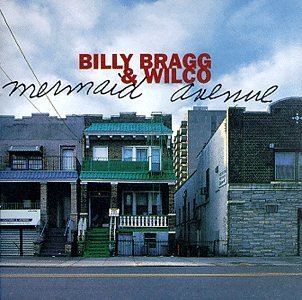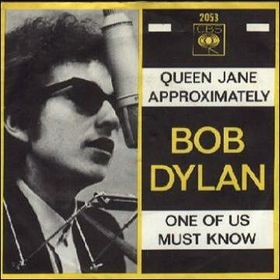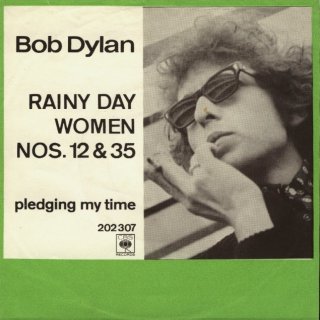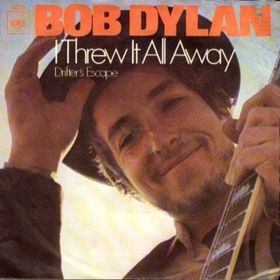
Highway 61 Revisited is the sixth studio album by American singer-songwriter Bob Dylan, released on August 30, 1965, by Columbia Records. Having until then recorded mostly acoustic music, Dylan used rock musicians as his backing band on every track of the album, except for the closing track, the 11-minute ballad "Desolation Row". Critics have focused on the innovative way Dylan combined driving, blues-based music with the subtlety of poetry to create songs that captured the political and cultural chaos of contemporary America. Author Michael Gray has argued that, in an important sense, the 1960s "started" with this album.

"Like a Rolling Stone" is a song by American singer-songwriter Bob Dylan, released on July 20, 1965, by Columbia Records. Its confrontational lyrics originated in an extended piece of verse Dylan wrote in June 1965, when he returned exhausted from a grueling tour of England. Dylan distilled this draft into four verses and a chorus. "Like a Rolling Stone" was recorded a few weeks later as part of the sessions for the forthcoming album Highway 61 Revisited.

Mermaid Avenue is a 1998 album of previously unheard lyrics written by American folk singer Woody Guthrie, put to music written and performed by British singer Billy Bragg and the American band Wilco. The project was the first of several such projects organized by Guthrie's daughter, Nora Guthrie, original director of the Woody Guthrie Foundation and archives. Mermaid Avenue was released on the Elektra Records label on June 23, 1998. A second volume of recordings, Mermaid Avenue Vol. II, followed in 2000 and both were collected in a box set alongside volume three in 2012 as Mermaid Avenue: The Complete Sessions. The projects are named after the song "Mermaid's Avenue", written by Guthrie. This was also the name of the street in Coney Island, New York, on which Guthrie lived. According to American Songwriter Magazine, "The Mermaid Avenue project is essential for showing that Woody Guthrie could illuminate what was going on inside of him as well as he could detail the plight of his fellow man". It was voted number 939 in Colin Larkin's All Time Top 1000 Albums 3rd Edition (2000).
"Ballad of a Thin Man" is a song written and recorded by Bob Dylan, and released in 1965 on his sixth album, Highway 61 Revisited.

"Positively 4th Street" is a song written and performed by Bob Dylan, first recorded in New York City on July 29, 1965. It was released as a single by Columbia Records on September 7, 1965, reaching No. 1 on Canada's RPM chart, No. 7 on the U.S. Billboard Hot 100, and No. 8 on the UK Singles Chart. Rolling Stone magazine ranked the song as No. 203 in their 500 Greatest Songs of All Time list.

"Highway 61 Revisited" is the title track of Bob Dylan's 1965 album Highway 61 Revisited. It was also released as the B-side to the single "Can You Please Crawl Out Your Window?" later the same year. In 2004, Rolling Stone magazine ranked the song as number 364 in their 500 Greatest Songs of All Time.

"Queen Jane Approximately" is a song from Bob Dylan's 1965 album Highway 61 Revisited. It was released as a single as the B-side to "One of Us Must Know " in January 1966. It has also been covered by several artists, including the Grateful Dead and The Four Seasons.

"Just Like Tom Thumb's Blues" is a song written and performed by Bob Dylan. It was originally recorded on August 2, 1965, and released on the album Highway 61 Revisited. The song was later released on the compilation album Bob Dylan's Greatest Hits Vol. II and as two separate live versions recorded at concerts in 1966: the first of which appeared on the B-side of Dylan's "I Want You" single, with the second being released on The Bootleg Series Vol. 4: Bob Dylan Live 1966, The "Royal Albert Hall" Concert. The song has been covered by many artists, including Gordon Lightfoot, Nina Simone, Barry McGuire, Judy Collins, Frankie Miller, Linda Ronstadt, the Grateful Dead, Neil Young, The Black Crowes, Townes Van Zandt, and Bryan Ferry. Lightfoot's version was recorded only weeks after Dylan's original had been released and reached #3 on the Canadian RPM singles chart.

Postcards of the Hanging is a compilation album by the Grateful Dead. It consists entirely of Bob Dylan covers, performed live in concert, along with a rehearsal performance of "Man of Peace" featuring the Grateful Dead backing Dylan himself. Bob Weir sings lead on five tracks, Jerry Garcia on three, and Phil Lesh on one ; Weir and Garcia also alternate on one. Another Dylan covers collection, Garcia Plays Dylan, includes several performances by the Grateful Dead, but mostly by the Jerry Garcia Band and other Garcia side projects. An album of live performances containing Dylan and the Grateful Dead performing together was released in 1989 as "Dylan & the Dead."
"It's Alright, Ma " is a song written and performed by Bob Dylan and first released on his 1965 album Bringing It All Back Home. It was written in the summer of 1964, first performed live on October 10, 1964, and recorded on January 15, 1965. It is described by Dylan biographer Howard Sounes as a "grim masterpiece".

"I Want You" is a song by American singer-songwriter Bob Dylan, which was released as a single in June 1966, and, later that month, on his seventh studio album, Blonde on Blonde. The song was written by Dylan, and produced by Bob Johnston. The song has been interpreted as a straightforward expression of lust, although critics have highlighted that the symbolism of the song is complex. It was the last song recorded for Blonde on Blonde, with several takes recorded in the early hours of March 10, 1966. It was included on Bob Dylan's Greatest Hits (1967). The song has received a largely positive critical reception, with a number of commentators highlighting Dylan's use of imagery, although some of the meanings are obscure.

"Pledging My Time" is a blues song by American singer-songwriter Bob Dylan from his seventh studio album, Blonde on Blonde (1966). The song, written by Dylan and produced by Bob Johnston, was recorded on March 8, 1966 in Nashville, Tennessee. Dylan is featured on lead vocals, harmonica, and guitar, backed by guitarist Robbie Robertson and an ensemble of veteran Nashville session men.

"Tupelo Honey" is a popular song written by Northern Irish singer-songwriter Van Morrison and the title song from his 1971 album, Tupelo Honey. The title derives from an expensive, mild-tasting tupelo honey produced in the southeastern United States. Released as a single in 1972, it reached number 47 on the U.S. pop chart.
"It Takes a Lot to Laugh, It Takes a Train to Cry" is a song written by Bob Dylan, that was originally released on his album Highway 61 Revisited. It was recorded on July 29, 1965. The song was also included on an early, European Dylan compilation album entitled Bob Dylan's Greatest Hits 2.
"Everybody Loves You Now" is a song written by Billy Joel. It was first released on his 1971 debut album Cold Spring Harbor and was also released as a b-side to his singles "She's Got a Way" and "Tomorrow Is Today." Live versions were included on the albums Songs in the Attic, 12 Gardens Live and Live at Shea Stadium: The Concert.
Robert J. Gregg was an American musician who performed as a drummer and record producer. As a drum soloist and band leader he recorded one album and several singles, including one Top 40 single in the United States. But he is better known for his work as a drummer on several seminal 1960s songs, including Bob Dylan's "Like a Rolling Stone" and Simon and Garfunkel's "The Sound of Silence". He was also temporarily a member of the Hawks, who later became known as the Band.

"I Threw It All Away" is a song by American singer-songwriter Bob Dylan. The track appeared on Dylan's album Nashville Skyline in 1969, and was released as its first single later that year, where it reached number 85 on the Billboard Hot 100, and number 30 on the UK Singles Chart. It is considered to be one of the best and most popular songs on the album.

The Original Mono Recordings is a box set compilation album of recordings by Bob Dylan, released in October 2010 on Legacy Recordings, catalogue 88697761042. It consists of Dylan's first eight studio albums in mono on nine compact discs, the album Blonde on Blonde being issued on two discs in its original vinyl format. It does not include the singles collection Bob Dylan's Greatest Hits released during the same time span. The set includes a 56-page booklet with photographs, discographical information, and an essay by Greil Marcus. It peaked at No. 152 on the Billboard 200.

The Bootleg Series Vol. 12: The Cutting Edge 1965–1966 is a compilation album by American singer-songwriter Bob Dylan, released on Legacy Records in November 2015. The tenth installment in the ongoing Bob Dylan Bootleg Series, it comprises recordings from 1965 and 1966, mostly unreleased demos and outtakes from recording sessions for his groundbreaking albums Bringing It All Back Home, Highway 61 Revisited and Blonde on Blonde. The standard set peaked at #41 on the Billboard 200.

"Obviously 5 Believers" is a song by American singer-songwriter Bob Dylan, which was released as the last track of side three of his double album Blonde on Blonde (1966), and was the B-side to the single release of "Just Like a Woman" for releases in America and some other countries. The song was written by Dylan and produced by Bob Johnston. It was recorded at Columbia Music Row Studios, in the early morning hours of a March 9–10, 1966 session. Four takes were recorded, although the first two were incomplete. It has been interpreted as a blues song about loneliness, with critics noting similarities in melody and structure to Memphis Minnie's "Chauffeur Blues". Dylan's vocals and the musicianship of the band on the track have both received critical acclaim, although the track has been regarded as insubstantial by some commentators.















